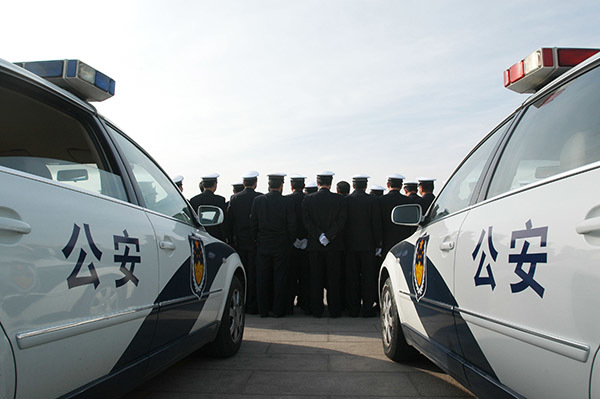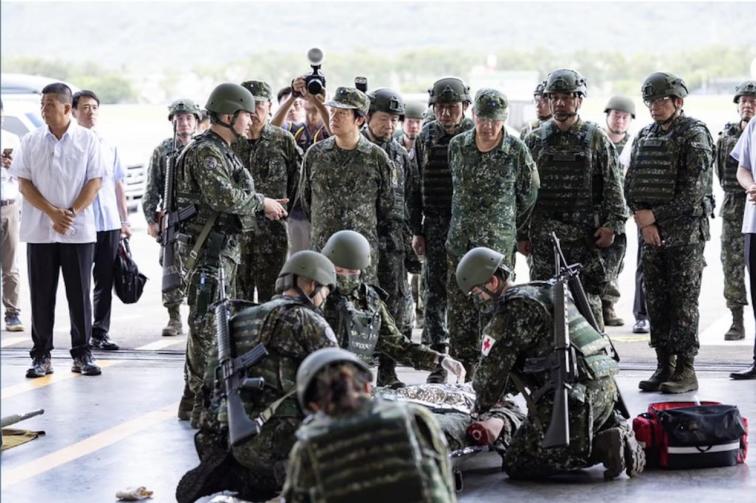BEIJING, CHINA - MARCH 11: China&9;s President Xi Jinping (L) speaks with former Premier Li Keqiang (C) and National People&9;s Congress Chairman Zhao Leji (R) during the fourth plenary session of the National People&9;s Congress on March 11, 2023, in Beijing, China. China's annual political gathering, known as the Two Sessions, convenes the nation's leaders and lawmakers to set the government's agenda for domestic economic and social development for the next year. (Photo by Lintao Zhang/Getty Images)
[People News] As the annual Beidaihe political retreat approaches, speculation about Xi Jinping’s diminishing influence has saturated Chinese-speaking media. Recently, the CCP Politburo held a rare June meeting and publicly released the Regulations on the Work of the Party Central Committee’s Decision-Making and Deliberation Bodies, a move that signalled further limits on Xi's power. Amidst this sensitive moment, former Premier Li Keqiang—once Xi’s most significant political rival and the Party’s second-in-command—has seemingly “resurfaced” to bolster the movement against Xi.
Party Media Rekindles Interest in Li Keqiang—Loaded with Political Implications
On July 3, marking what would have been Li Keqiang’s 70th birthday, People’s Daily published a lengthy commemorative article. On page six of the paper, the article titled “Devoted to the Party and the People’s Cause for Life—Commemorating Comrade Li Keqiang on His 70th Birthday” gave high praise to Li’s legacy, hailing him as “a tested and loyal communist warrior, an outstanding proletarian revolutionary and statesman, and an exceptional leader of the Party and state.”
The first section, prominently titled “Powerfully Advancing the Work of the Communist Youth League in Service of the Party and State’s Overall Agenda,” is especially striking. The Communist Youth League faction (“Tuanpai”) has always been a thorn in Xi's side. Rumours before the 20th Party Congress suggested Xi might step down while Li would rise—a narrative that reportedly left Xi deeply unsettled. At the Congress, Xi purged the Tuanpai, famously escorting Hu Jintao out of the venue, an incident widely condemned as a Mao-style authoritarian power grab. After the Third Plenum, Xi lost control of the military, and now the Tuanpai is making a comeback in Zhongnanhai. The political tides are shifting, with talk of a “Xi-down, Wang-up” or “Xi-down, Hu-up” restructuring. For Xi, the Tuanpai is a deeply painful and personal political trauma, and the People’s Daily’s choice to commemorate Li directly touches a raw nerve.
Li Keqiang died suddenly of a heart attack in Shanghai on October 27, 2023. Many observers believe his death was a result of CCP power struggles and suspect Xi’s involvement. Although the regime issued an official obituary and biography filled with praise and organised a grand state funeral for Li—widely interpreted as Xi’s attempt to absolve himself of blame—the public was not convinced. A massive outpouring of grief took place in Li’s hometown of Hefei, with millions laying wreaths. Authorities responded nervously with strict online censorship, even pulling singer Fish Leong’s song “Sadly, It Wasn’t You” offline.
The 6,000-word tribute on Li’s 70th birthday mentioned “reform” 21 times, “opening-up” eight times, and “the people” a striking 29 times. The article emphasised Li’s deep care for the masses, noting his visits to factories, fields, and grassroots communities, always “listening closely to public concerns” and “easing people’s hardships.” The narrative paints Li as a man of the people, filled with praise and admiration.
This tribute reads like an upgraded version of Li Keqiang’s obituary, using renewed attention on him to catalyse Xi’s downfall.
Fierce Infighting: Xi's Faction Tentatively Distances Itself from Him
The article’s timing and content are both highly sensitive, and several strange aspects surrounding its publication reveal ongoing intense power struggles within the CCP over Xi’s diminishing influence.
Oddity #1: The Editor’s Note. At the start of the article, there’s an editor’s note that reads: “July 3 marks the 70th birthday of Comrade Li Keqiang. In accordance with Party Central regulations regarding commemorative activities for deceased Party and state leaders, this newspaper publishes an article titled ‘Devoted to the Party and the People’s Cause for Life,’ written by the Central Committee’s Institute of Party History and Literature.”
In 1996, the General Offices of the CCP Central Committee and State Council jointly issued a notice stating that commemorative activities for deceased national-level leaders should be held every decade (10, 50, or 100 years). Of these, centennial commemorations are the most significant. For 50-year anniversaries, commemorations are typically held in the leader’s birthplace. For 10-year anniversaries, the Party typically publishes commemorative articles.
Li Keqiang’s 70th birthday thus falls within this guideline. People’s Daily did something similar in 2008 for Politburo Standing Committee member Huang Ju, publishing “Diligent and Dedicated—Huang Ju’s Days in the State Council.” Huang, who died in 2007 at age 69, received a typical 70th birthday tribute, written by the same Party History office, without any editor’s note. Similarly, a 2011 article for former leader Hua Guofeng’s 90th birthday had no editor’s note and was a routine official piece.
So why did Li Keqiang’s article include this editor’s note? Possibly as a preemptive disclaimer, emphasising that this was a mandated action rather than a spontaneous one—a bureaucratic distancing tactic. Yet such disclaimers cannot mask the political implications of the article. As the saying goes, a sensitive piece, once published, can’t be undone. The “disclaimer” isn’t so much a depoliticisation as it is a “disclaimer of responsibility.” In December 2021, Institute head Qu Qingshan published a piece in People’s Daily praising Deng Xiaoping’s reform and opening-up, without mentioning Xi at all. The precedent speaks volumes.
Oddity #2: Article Restricted on WeChat. According to China Digital Times, Chinese Party and government agencies were instructed not to forward the article. On WeChat, netizens tested and confirmed that the article was indeed being suppressed. Only one account—“History of the Party” (run by the Party History Research Office)—was allowed to keep the repost. Its views quickly exceeded 100,000.
This censorship move was almost certainly ordered by Xi via his close ally Cai Qi. In March 2024, sources told South China Morning Post that Cai Qi had been appointed director of the Central Cyberspace Affairs Commission, making him China’s new “Internet Czar.” Suppressing Li Keqiang’s tribute was a classic online stability-maintenance move, designed to prevent the article from becoming the final straw that topples Xi’s regime.
Oddity #3: Qiushi Magazine Tests the Waters, Then Retreats. Qiushi, the CCP’s flagship ideological journal, initially published the Li Keqiang tribute—but then quickly took it down. It now returns a “404 Not Found” error and cannot be found via search on the site.
According to precedent, commemorative articles for deceased state-level leaders are typically published every ten years, and usually only by the CCP’s official newspaper, People’s Daily. The Party’s official theoretical journal, Qiushi, generally does not reprint such pieces. For example, the commemorative articles for Huang Ju and Hua Guofeng were not reprinted by Qiushi.
So why did Qiushi break precedent this time by reprinting the commemorative article for Li Keqiang? As the ideological mouthpiece of the Chinese Communist Party—the spiritual blood bank of the CCP—how could it make such a political misstep?
Public information shows that in June 2025, Zhou Aibing, former Director of the Regulations Division of the Policy Research Office under the Central Propaganda Department, was appointed as the editor-in-chief of Qiushi magazine. Previously, the position had been held concurrently by the magazine’s publisher, Chen Yangyong, who is currently a member of the 14th CPPCC and serves on the Culture, History, and Learning Committee. Chen, who holds a PhD in history from Fudan University, is very likely affiliated with Wang Huning.
Zhou Aibing is possibly aligned with Li Shulei. However, the Policy Research Office of the Central Propaganda Department is also considered Xi Jinping’s political “beauty salon” (i.e., a place where his image is carefully crafted). Li Shulei belongs to the Central Party School faction and has been one of Xi Jinping’s chief speechwriters and close confidants—a political penman, so to speak. Yet Li Shulei holds a PhD in literature from Peking University, and Li Keqiang was also a Peking University graduate. Could this shared academic background have fostered a sense of values and emotional affinity within Li Shulei that outsiders would find hard to detect? It’s difficult to know for certain.
What is more likely, however, is that Xi Jinping’s loss of power has already become an open secret within the Party. Former subordinates, speechwriters, and propagandists are now shifting with the political winds, drawing their swords and cutting ties with Xi. △
(First published by People News)











News magazine bootstrap themes!
I like this themes, fast loading and look profesional
Thank you Carlos!
You're welcome!
Please support me with give positive rating!
Yes Sure!